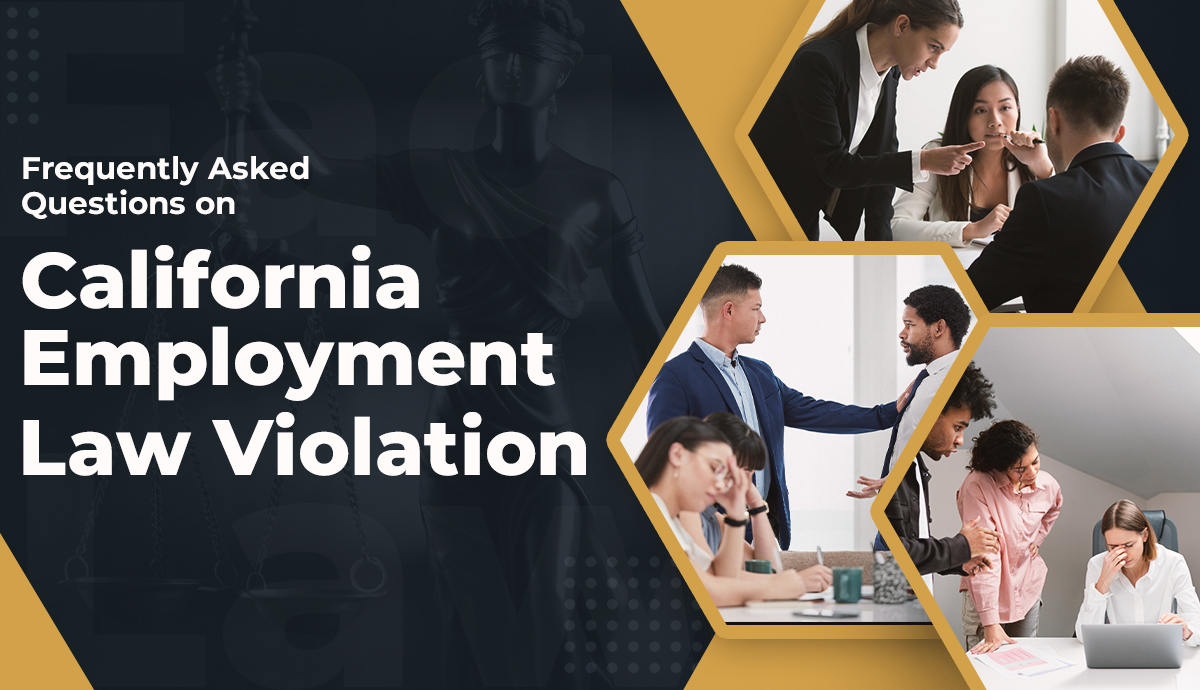As an employee, you are entitled to a welcoming and safe work environment. A safe and comfortable workplace is free from discrimination, sexual harassment, and retaliation. There are many cases of managers abusing their authoritative positions, subjecting employees to assault or sexual harassment, or terminating employees because of their gender, race, pregnancy, disability, etc. These are all unacceptable in a civilized society. You must never accept or ignore such behavior.
Below, I answer some of the most-asked questions regarding employment law in California. This blog post, just like all of our posts, is intended to acquaint you with your rights and how to exercise them.
Related: Key Role Of An Employment Lawyer In Discrimination Cases
What Are California’s Labor Laws?
Californian labor laws have many things to discuss, but here are the vital things you should know.
- California is an at-will employment state, so your employer can dismiss you without warning for a justifiable reason.
- Since it is an at-will employment state, you can leave your company without warning or reason.
- If you are a non-exempt employee, you can have a 10-minute break every four hours and a 30-minute break if you work more than five hours daily.
- Your employer must pay overtime (1.5 times your regular pay rate) if you work more than eight hours a day or 40 hours a week.
- As an employee, you are entitled to a minimum wage of $12.00 per hour.
What is the Equal Pay Act?
Established in 1963, the Equal Pay Act forbids wage discrimination between a male and female employee depending on their sex if they have the same responsibilities. However, although legislated, some employees continue to face this discrimination in their workplace.
What is Wrongful Termination?
It means an employer breached public policies in the California statutes, constitutional provisions, or regulations. For instance, an employer cannot fire an employee for their race, age, pregnancy, gender, national origin, marital status, sexual orientation, taking a medical leave, or because they were involved in whistleblowing or opposing certain specified unethical, unlawful, or fraudulent practices.
What is the Difference Between Harassment and Discrimination?
Harassment can occur between coworkers or can also mean an employee received poor treatment because of gender, race, sexual preference, etc. On the other hand, discrimination occurs between an employee and an employer and refers to an unjustified action like being unlawfully fired from the job because of a protected characteristic.
How Do You File a Harassment Lawsuit?
First, file a complaint with your company. I recommend you talk to your HR before seeking legal help for the long-term protection of your rights. It allows you to hold your company accountable if the case goes to court. How? Accountability comes from the fact that your company knew your problem but did not resolve it.
Then, file an administrative charge with the Equal Employment Opportunity Commission (EEOC). If you have already hired an employment attorney in Los Angeles, they can help you maneuver the critical paperwork and get the information you need to build a robust case.
The EEOC will look into your charge and take justifiable action. Having a legal professional in this state helps you with the short deadlines between every necessary step.
What is a Class Action Lawsuit?
It is a lawsuit brought by a single employee or a group of employees on behalf of other similar employees who work or have worked for a specific employer. A California class action lawsuit is the most effective way to recover on behalf of a group of employees for systematic labor code violations a single employer committed.
The biggest advantage of a class action lawsuit is that each worker’s claim powers the claims of other workers in the state.
How Do You File a Class Action Lawsuit?
To file a class action lawsuit, you must have one or more representative plaintiffs. Then, file your lawsuit with a reliable employment law attorney, who will assist you in building your case and get the class action certified in court.
Also Read: How Long Can An Employer Hold Your Paycheck After Termination?



